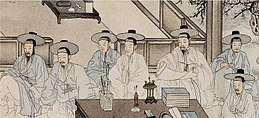Chinese-language literature of Korea
Chinese-language literature in Korea (Korean hanmunhak) is literature written the Chinese language in Korea, which represents an early phase of Korean literature and influenced literature in the Korean language.[1]
 |
| Part of a series on the |
| Culture of Korea |
|---|
| History |
|
Festivals |
|
|
Music and performing arts |
|
Media
|
|
|
Monuments
|
|
National symbols of Korea
|
Classical Chinese in Korea
The role of the Classical Chinese Han language or Hanmun language in Korea was akin to the same role in Japan of Chinese Kanbun and in Vietnam of Chinese Hán văn; a role which is broadly comparable to that of the Latin language in Europe.[2] During this period the use of written Chinese language did not indicate that Korean literati were fluent in spoken Chinese.[3]
Korean literature
The role of Chinese language was so dominant that the history of Korean literature and Chinese language are almost contiguous till the 20th Century.
Korean works in Chinese are typically rendered in English according to modern Korean hangul pronunciations:
- Samguk Sagi (三國史記) "Three Kingdoms History"
- Samguk Yusa (三國遺事) "Memorabilia of the Three Kingdoms"
- Geumo Sinhwa (金鰲新話) "New stories from Mount Geumo"
It is disputed whether Chinese or Korean was the original language of some works:
- Dream of Nine Clouds (九雲夢, Hangul 구운몽).
References
- Korea journal Vol.3 p24 Yunesŭk'o Han'guk Wiwŏnhoe, Yunesŭkʻo Hanʼguk Wiwŏnhoe - 1963 "Literature in Chinese in Korea : At first Chinese literature in Korea was the preserve of the few, but as time went on it became the chief, if not the only, form of literature practised in the country by anyone. A spirit of abject admiration for China took ..."
- Korean frontier Vol.1-2 1970 p294 "Chinese literature in Korea: The Chinese culture that swept the Korean peninsula was somewhat similar to the Greek and Latin ... At the turn of the 20th century, when dynasty rule came to an end, hanmunhak, or Chinese literature in Korea, ."
- James B. Palais Confucian Statecraft and Korean Institutions: Yu Hyŏngwŏn and the ... 1996 p639 "Unfortunately, Yu found that despite the facility of educated Koreans in reading classical Chinese texts, there were absolutely no civil officials who understood the spoken Chinese language. King Sejong in the early fifteenth century had faced ..."